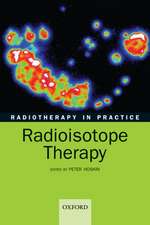Principles of Cancer Biotherapy
Editat de Robert K. Oldham, Robert O. Dillmanen Limba Engleză Paperback – 23 aug 2016
This book summarizes an evolving science and a rapidly changing medical practice in biotherapy. In this new millennium, it is now possible to envision a much more diversified system of cancer research and treatment that will afford greater opportunities for a patient’s personalized cancer treatment. This was first envisioned in the 1987 initial edition of this textbook and is now a “new” and popular approach to cancer treatment. Some forms of cancer biotherapy use the strategy of tumor stabilization and control through continued biological therapy, akin to the use of insulin in the treatment of diabetes.
This textbook illustrates new methods of thinking and new strategies for control of cancer. It is always difficult to move from past dogma to future opportunity, but this fifth edition of Principles of Cancer Biotherapy illustrates why it is so important to the patients for researchers and clinicians to explore and quickly apply these new opportunities in cancer biotherapy.
| Toate formatele și edițiile | Preț | Express |
|---|---|---|
| Paperback (1) | 2154.13 lei 6-8 săpt. | |
| SPRINGER NETHERLANDS – 23 aug 2016 | 2154.13 lei 6-8 săpt. | |
| Hardback (1) | 2164.58 lei 6-8 săpt. | |
| SPRINGER NETHERLANDS – 10 sep 2009 | 2164.58 lei 6-8 săpt. |
Preț: 2154.13 lei
Preț vechi: 2267.51 lei
-5% Nou
Puncte Express: 3231
Preț estimativ în valută:
412.19€ • 449.14$ • 347.33£
412.19€ • 449.14$ • 347.33£
Carte tipărită la comandă
Livrare economică 23 aprilie-07 mai
Preluare comenzi: 021 569.72.76
Specificații
ISBN-13: 9789401776257
ISBN-10: 9401776253
Pagini: 742
Ilustrații: XI, 742 p.
Dimensiuni: 210 x 279 mm
Greutate: 1.67 kg
Ediția:Softcover reprint of the original 5th ed. 2009
Editura: SPRINGER NETHERLANDS
Colecția Springer
Locul publicării:Dordrecht, Netherlands
ISBN-10: 9401776253
Pagini: 742
Ilustrații: XI, 742 p.
Dimensiuni: 210 x 279 mm
Greutate: 1.67 kg
Ediția:Softcover reprint of the original 5th ed. 2009
Editura: SPRINGER NETHERLANDS
Colecția Springer
Locul publicării:Dordrecht, Netherlands
Cuprins
Cancer biotherapy: general principles.- The pathogenesis of cancer metastasis: relevance to therapy.- Developmental therapeutics and the design of clinical trials.- Recombinant proteins and genomics in cancer therapy.- Current concepts in immunology.- Therapeutic approaches to cancer-associated immune suppression.- Cancer vaccines.- Cytokines.- Interferons: therapy for cancer.- Monoclonal antibody therapy.- Immunotoxins.- Drug Immunoconjugates.- Targeted radionuclide therapy of cancer.- Stem cell/bone marrow transplantation as biotherapy.- Cellular immunotherapy (CI), where have we been and where are we going?.- Growth and differentiation factors as cancer therapeutics.- Granulocyte colony-stimulating factor: biology and clinical potential.- Granulocyte-macrophage colony-stimulating factor.- Cancer gene therapy.- Regulatory process for approval of biologicals for cancer therapy.- Cancer biotherapy: 2009 disease-related activity.- Biological therapy of melanoma.- Biological therapy of genitourinary cancer.- Biological therapy of colon cancer.- Biological therapy of breast cancer.- Biological therapy of lung cancer.- Biological therapy of B and T cell lymphoproliferative disorders.- Biological therapy of multiple myeloma.- Biological therapy of squamous cell cancers of the head and neck.- Biological therapy of glioblastoma.- Speculations for 2009 and beyond.
Textul de pe ultima copertă
At the time of the first edition of Principles of Cancer Biotherapy in 1987, this book represented the first comprehensive textbook on biological therapy. In 1991, when the second edition was published, there was still some doubt on the part of many oncologists and cancer researchers as to the therapeutic value of these new approaches. By 2003 and the fourth edition, it was generally agreed that biopharmaceuticals were producing major opportunities for new cancer therapies. Cancer biotherapy has now truly matured into the fourth modality of cancer treatment. This fifth revised edition describes the tremendous progress that has been made in recent years using biologicals in cancer treatment.
This book summarizes an evolving science and a rapidly changing medical practice in biotherapy. In this new millennium, it is now possible to envision a much more diversified system of cancer research and treatment that will afford greater opportunities for a patient’s personalized cancer treatment. This was first envisioned in the 1987 initial edition of this textbook and is now a "new" and popular approach to cancer treatment. Some forms of cancer biotherapy use the strategy of tumor stabilization and control though continued biological therapy, akin to the use of insulin in the treatment of diabetes.
This textbook illustrates new methods of thinking and new strategies for control of cancer. It is always difficult to move from past dogma to future opportunity, but this fifth edition of Principles of Cancer Biotherapy illustrates why it is so important to the patients for researchers and clinicians to explore and quickly apply these new opportunities in cancer biotherapy.
This book summarizes an evolving science and a rapidly changing medical practice in biotherapy. In this new millennium, it is now possible to envision a much more diversified system of cancer research and treatment that will afford greater opportunities for a patient’s personalized cancer treatment. This was first envisioned in the 1987 initial edition of this textbook and is now a "new" and popular approach to cancer treatment. Some forms of cancer biotherapy use the strategy of tumor stabilization and control though continued biological therapy, akin to the use of insulin in the treatment of diabetes.
This textbook illustrates new methods of thinking and new strategies for control of cancer. It is always difficult to move from past dogma to future opportunity, but this fifth edition of Principles of Cancer Biotherapy illustrates why it is so important to the patients for researchers and clinicians to explore and quickly apply these new opportunities in cancer biotherapy.
Caracteristici
Comprehensive focus on biological therapy for cancer Multiple expert authors









